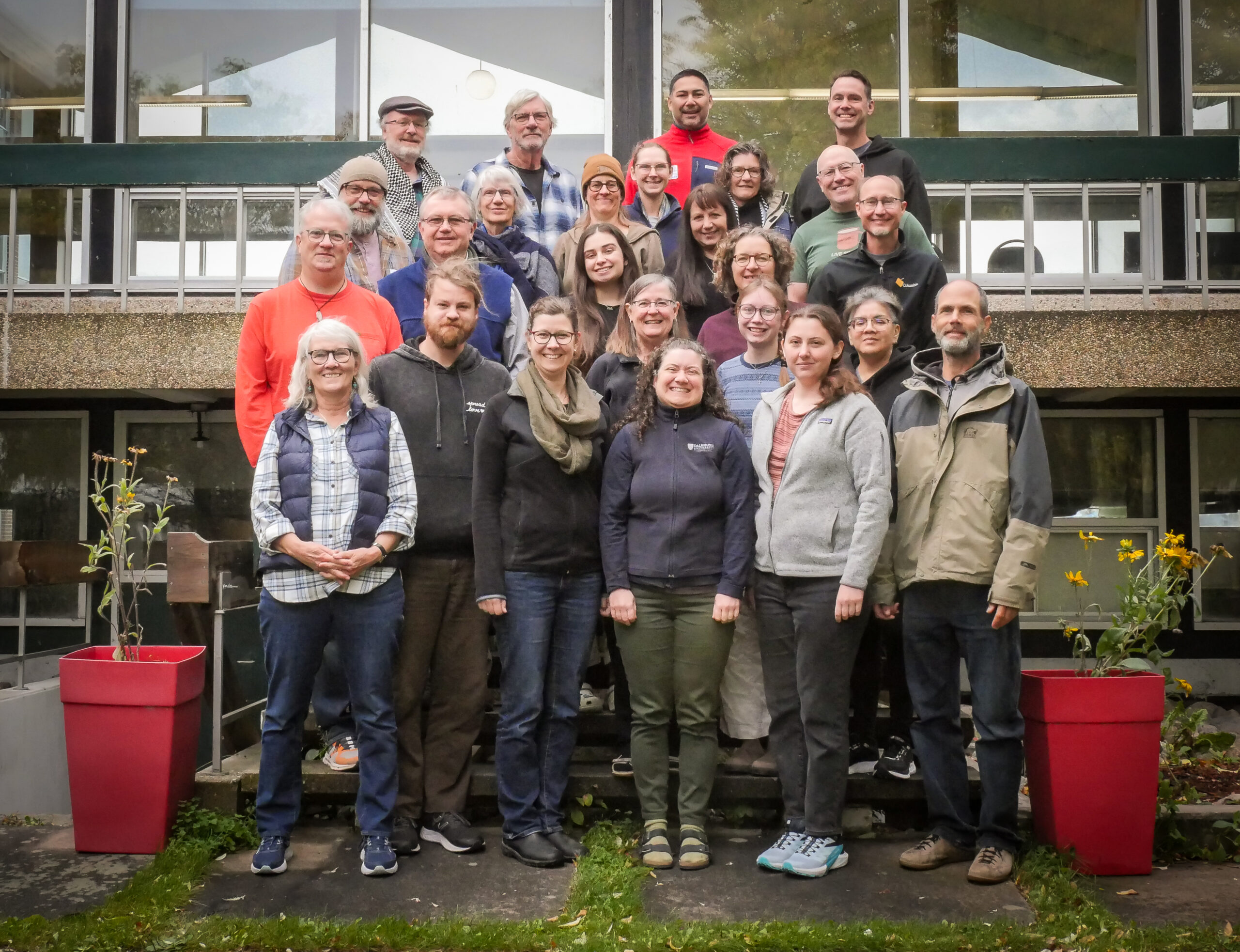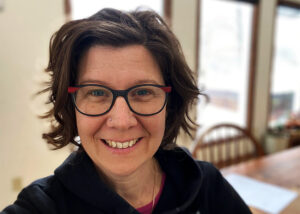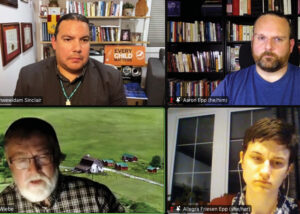Twenty-five people involved in climate and Indigenous relations working groups within Mennonite Church Canada regional churches, as well as people from related organizations, gathered at Wilderness Edge Retreat and Conference Centre in Pinawa, Manitoba, from October 4-6, to discuss their work and hopes.
The retreat was led by MC Canada’s climate action coordinator Sandy Plett, and Indigenous relations coordinator Jonathan Neufeld.
The collaborative event marked the first time MC Canada’s regional church working groups in both climate action and Indigenous relations had met in person.
Since beginning in their roles in 2022, Plett and Neufeld have met regularly with their respective working groups via video calls. They have dreamed of having a collaborative event for over a year, Plett said.
“Your Zoom connections are made more fruitful if you’ve actually sat together and laughed over a card game,” said Plett, who emphasized that the benefit of connecting the regional groups means she and Neufeld don’t become the “hub of conversations.”
“Nobody has to talk to me in order to get a message to a person in the other region who’s doing similar work. They can just talk directly to each other,” she said.
The groups were invited to consider how their posture and guiding values affect their regional work. Newer groups were given the opportunity to hear from more established ones, and the groups gave feedback to Plett and Neufeld, respectively, on MC Canada’s Environmental Sustainability Report, published in July, and on recommendations to repudiate the Doctrine of Discovery that are going before MC Canada’s Joint Council.
All five regional churches have climate action working groups, and until recently, all except Alberta had Indigenous relations working groups. Mennonite Church Alberta officially formed an Indigenous relations working group three weeks after the Pinawa gathering.
Charlene Lauzier, 22, and Liesel Retzlaff, 20, both from Foothills Mennonite Church in Calgary, attended the gathering on behalf of MCA. They formed MCA’s creation care working group last April after attending “Living Hope,” a creation care event for youth at Camp Assiniboia co-hosted by Plett and MC Manitoba.
“When we got [to “Living Hope”] we learned that all the provinces had a working group related to climate and creation care, but Alberta did not,” said Retzlaff. “Four of us wanted to change that. We sent an email to the executive minister [Tim Wiebe-Neufeld] and he was like, ‘Okay, great, you can do that.’”
The women attended the Pinawa gathering with five other MCA reps, forming the largest regional church group at the gathering. Retzlaff was impressed by the experience and knowledge around the circle, and the passion from older folks.
“I think there’s this rep that older generations don’t care, but there was so much passion in that room,” she said. “We were the youngest ones there by far probably, but they’re so excited that we’re there and they want to hear what we have to say.”
Lauzier appreciated the talking circles at the beginning and end of the weekend, where people shared what they were wrestling with. She also enjoyed the “community singing,” where the group stood in a circle sang in call-and-response style.
“That was a really cool experience to be all together and worshipping God but also thanking God for creation and all the people that were there and all of our ancestors and the people that have come before us,” she said.
Plett and Neufeld led discussions on the intersections between climate action and Indigenous relations work.
“We are mirrors of each other in the work,” said Neufeld, about himself and Plett. “We have tried … to keep the message going that these are overlapping conversations, these are not silos,” he said, acknowledging the work that former Indigenous-Settler Relations program director Steve Heinrichs did to bring climate action into the Indigenous-Settler Relations portfolio.
“In separating this out into two roles, we could lose some of the integrative ways it was being worked at before and so we’re just trying to build that into the fabric of community. We just cannot have these conversations in isolation,” Neufeld said.
Lauzier and Retzlaff were conscious of the fact they and other participants flew to the gathering, and that the majority of voices around the circle were not Indigenous.
“I think is important to not get caught up in, ‘Oh this is a cool idea … this is what we could do,’ rather than asking Indigenous people or those fully educated and a part of those communities what we can do,” said Lauzier.
Four people attended from B.C., seven from Alberta, two from Saskatchewan, five from Manitoba and five from Eastern Canada. Except for MCA, the number of people representing each working group in each region was fairly even. Among those in attendance were seven Mennonite Central Committee staff people.
The weekend ended with worship at Pinawa Christian Fellowship on Sunday morning.
MC Canada paid for the participants’ travel, food and accommodation. The working groups have an opportunity to meet again in person at the Mennonite Church Canada Gathering 2025 in Kitchener-Waterloo, Ontario.








Leave a Reply
You must be logged in to post a comment.